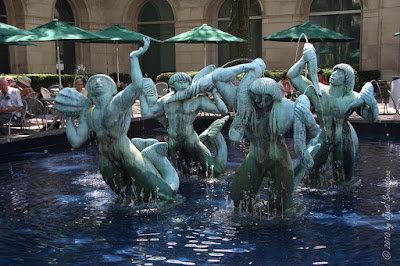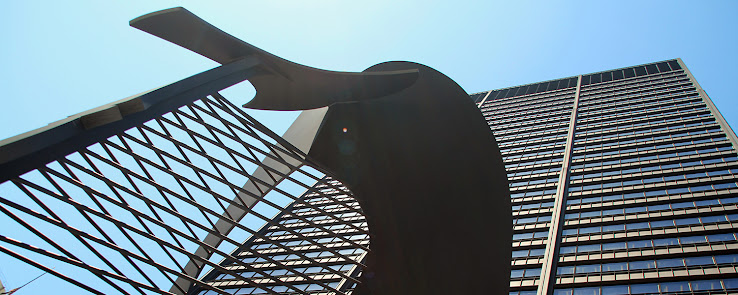 |
| Fountain of the Tritons - by Carl Milles |
.
The Art Institute of Chicago
McKinlock Court & the Fountain of the Tritons
McKinlock Court
It's a 11,640 square foot outdoor court at the Art Institute of Chicago. The centerpiece of this court is "Fountain of the Tritons" by Carl Milles. The court has beautiful Dutch Elm trees. The McKinlock Court is attached to the Garden Cafe of the AIC.
McKinlock Court was landscaped in 1924. By 1931 the court was remodeled so the Fountain of the Tritons could be installed. This court is open for dining during the summer months.
Fountain of the Tritons - by Carl Milles
Sponsored by the B. F. Ferguson Monument Fund, to commemorate John Ericsson and other Swedish Americans. Ericsson created the "Monitor", the first iron-clad turret ship, which did battle with the Merrimack in the Civil War.
 |
| Fountain of the Tritons - by Carl Milles |
 |
| Fountain of the Tritons - by Carl Milles |
Carl Milles
American (born Sweden), 1875-1955
Became U.S. citizen in 1945
Triton Fountain, 1926
Replica of garden fountain in Lidingo, Sweden,
installed at the Art Institute of Chicago in 1931.
Gift of a group of Americans of Swedish descent. Erected by the trustees of the B.F. Ferguson Monument Fund in commemoration of the distinguished service rendered in the United States by the Swedish American inventor John Ericsson (1803-1889).
 |
| Fountain of the Tritons - by Carl Milles |
.
Who/ What's a triton?
Triton is a mythological Greek god, the messenger of the sea. He is the son of Poseidon [God of the Sea], and Amphitrite [Goddess of the Sea]. He is usually represented as a merman, having the upper body of a human and the tail of a fish, with shoulders barnacled with seashells. Triton's special attribute was a twisted conch shell, on which he blew like a trumpet to calm or raise the waves.
.
 |
| Fountain of the Tritons - by Carl Milles |
The book Chicago's Public Sculpture by Ira J. Bach and Mary Lackritz Gray, has some interesting observation on the artist and this sculpture fountain. An excerpt...
Although Milles studies in Paris, where Auguste Rodin was one of his teachers, his fountains and memorials in his native Sweden and in the US represent a conscious departure from the naturalism that dominated sculpture at the turn of the century. They reflect the artists independent spirit, his appreciation of classical and Gothic sculptures and his very strong Nordic roots. These qualities are seen in the way Milles imbued his rather elongated and stylized Tritons, characters from Greek mythology, with the spirit of water deities from Scandinavian chronicles.


No comments:
Post a Comment